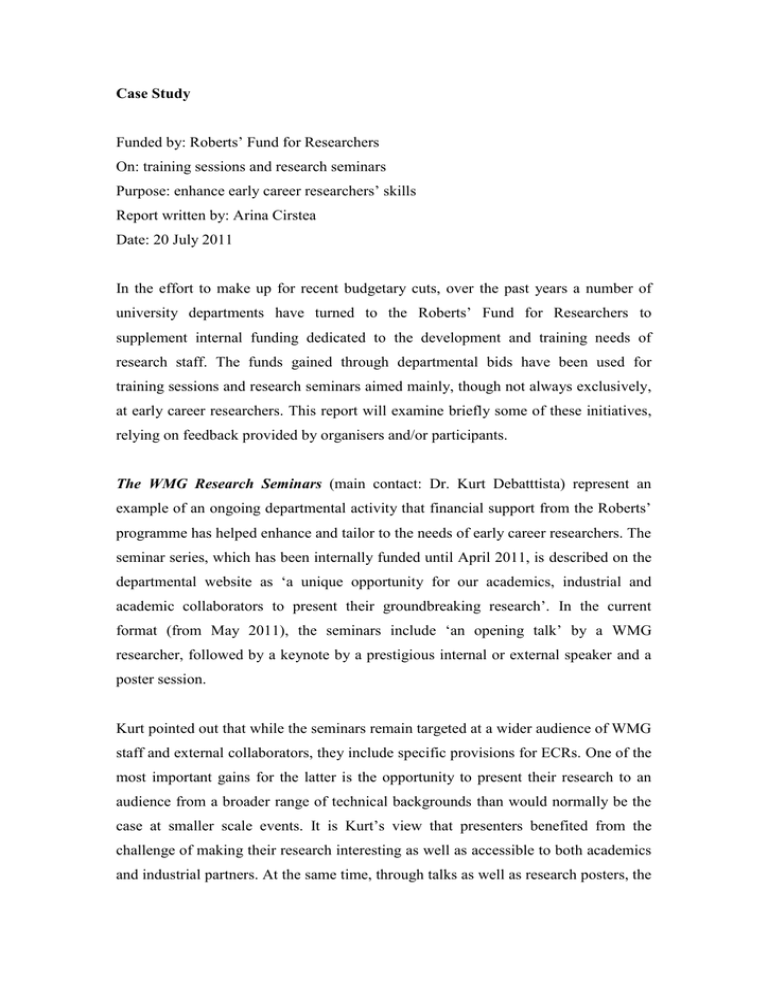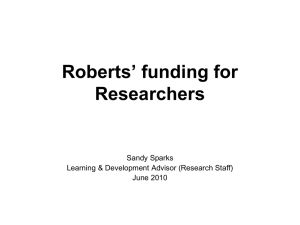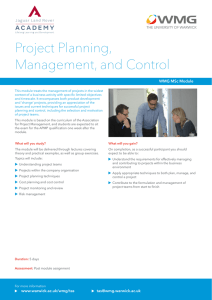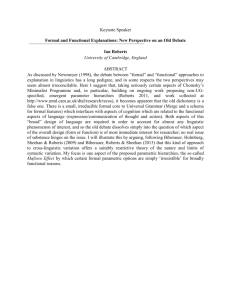Case Study Funded by: Roberts’ Fund for Researchers
advertisement

Case Study Funded by: Roberts’ Fund for Researchers On: training sessions and research seminars Purpose: enhance early career researchers’ skills Report written by: Arina Cirstea Date: 20 July 2011 In the effort to make up for recent budgetary cuts, over the past years a number of university departments have turned to the Roberts’ Fund for Researchers to supplement internal funding dedicated to the development and training needs of research staff. The funds gained through departmental bids have been used for training sessions and research seminars aimed mainly, though not always exclusively, at early career researchers. This report will examine briefly some of these initiatives, relying on feedback provided by organisers and/or participants. The WMG Research Seminars (main contact: Dr. Kurt Debatttista) represent an example of an ongoing departmental activity that financial support from the Roberts’ programme has helped enhance and tailor to the needs of early career researchers. The seminar series, which has been internally funded until April 2011, is described on the departmental website as ‘a unique opportunity for our academics, industrial and academic collaborators to present their groundbreaking research’. In the current format (from May 2011), the seminars include ‘an opening talk’ by a WMG researcher, followed by a keynote by a prestigious internal or external speaker and a poster session. Kurt pointed out that while the seminars remain targeted at a wider audience of WMG staff and external collaborators, they include specific provisions for ECRs. One of the most important gains for the latter is the opportunity to present their research to an audience from a broader range of technical backgrounds than would normally be the case at smaller scale events. It is Kurt’s view that presenters benefited from the challenge of making their research interesting as well as accessible to both academics and industrial partners. At the same time, through talks as well as research posters, the sessions have potentially enriched the specialist knowledge of all attending researchers. At a more general level, the dialogue between the research of ECRs and keynote speakers has implicitly contributed to promoting the quality of WMG research and teaching programmes among its industrial and academic partners. Kurt suggested that, should the Roberts’ award have not been available, the scale of participation – currently rising to 90 attendees for the first Roberts funded event and 75 for the second – would have had to be lowered. This would have undoubtedly affected the impact of seminars, so it may be argued that the Roberts’ fund has assisted WMG in achieving the full potential of an already thriving initiative. A similar concern with the training needs of ECRs underlies the application for Roberts’ funding submitted by Prof. Jane Hutton (Statistics). The award was used in conjunction with other sources to support the participation of early career staff to a Leadership and Teamworking Skills Workshop (8-10 July 2011). Jane rated the event as ‘successful’, stating that the feedback returned by participants ‘indicated that they enjoyed the weekend, and found the opportunity to evaluate themselves in a different environment extremely useful. They also felt that being able to be on an equal footing with more senior members of the department increased their feeling of being part of the Department of Statistics’. The seminar focused on enhancing the ‘communication, organisation, and teamwork’ skills of all categories of staff as well as doctoral students, and it is expected that the participants will share the best practice by contributing to the organisation of a similar event the following academic year. Among the outputs of this event, Jane has listed a DVD recording and a series of reflective accounts to be published on the departmental Intranet. The Faculty of Arts, represented by Prof. Karen O’Brien (currently, University of Birmingham), is another recipient of a departmental Roberts’ award. In the academic year 2010-11, alongside a number of other activities, this fund was used for the organisation of two Publishing Surgeries for Arts Faculty Researchers (27 January and 28 February). Fifteen postdoctoral researchers and doctoral students in the late stages of their registration have signed up for one-to-one tutorials with Josie Dixon, former commissioning editor at Cambridge University Press and Palgrave. As Karen explained during the Induction meeting, the Publishing Surgeries have been set up in response to feedback from the Early Career Publishing Workshop organised in the previous academic year. Among the benefits of their one-to-one session with Josie, participants listed a ‘clear’ and ‘useful’ explanation of publishers’ expectations (AH, AL), ‘a clearer insight into the argumentative, rhetorical and organisational elements of my book proposal’ (CN), ‘a lot of specific comments and advice about my abstract/research area’ as well as ‘practical tips and resources’ (CM) and the ‘productive and encouraging tone of the conversation’ (PK). Among the downsides, they noted the lack of more detailed information on the type and length of material that could be covered (AC, CM) and the ‘general’ focus of part of the session (AH, GC). One suggestion that may address this issue and maximize the impact of the consultations would be to continue to cover the more general areas of thesis/article publication in a workshop, ideally scheduled well in advance of the publishing surgeries, in order to allow participants to incorporate recommendations in their drafts (CN, GC). The predominantly positive feedback for all these departmental initiatives suggests that skills enhancement represents an important aspect in the individual development of ECRs. Quite clearly, dedicated funding is necessary in order to meet these training needs, and it can be predicted that individual departments will find it very hard to source in other ways the funding currently provided by the Roberts’ programme.


